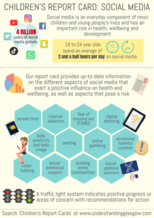21st century issues - social media
Click on the infographic for an overview of what’s in this report card.
Social media can be defined as websites and online applications which enable users to create and share content and participate in networking. Examples include: Facebook; Instagram; Snapchat;Twitter; WhatsApp; TikTok; and YouTube. Social media has existed since the 1990s in the form of internet chat rooms although it took until the early years of the 21st century with the launch of MySpace and Facebook for social media to become mainstream.
Today, there are over 4 billion users of social media globally and nearly every person in the UK aged 16-24 years uses social media. Most children and young people have never had to ‘learn’ social media, instead they have been brought up in a generation where it pre-existed and have experienced each new platform in real time.
We describe the positive and negative issues which arise from social media use among children and young people (aged 9+ years) in modern day middle- and high-income countries that have the potential to impact on the health and wellbeing of children and young people.
The indicators included are: excessive screen time and addiction; cyberbullying; poor body image; access to harmful content; fear of missing out; online gambling; sexting; exposure to body positivity content; political and social activism; building communities; social emotional support; and self-enforced digital detox.
Download the 21st century issues children's report card (PDF).








